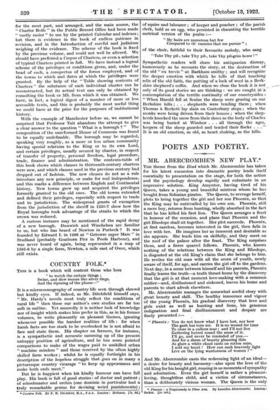COUNTRY FOLK.*
Tms is a book which will content those who love "to watch the certain things ; Swine, and slow moons like silver rings, And the ripening of the plums—"
It is a microcosmography of country life seen through shrewd but kindly eyes. If indeed, as Mr. Ditchfield himself says, "Mr. Hardy's novels most truly reflect the conditions of rural life" then these our author's own studies are far too soft in outline. Yet assuredly it is neither lack of knowledge nor of insight which makes him prefer in this, as in his former volumes, to write pleasantly on pleasant themes, ignoring whenever possible the harsher realities of life : for when harsh facts are too stark to be overlooked he is not afraid to face and state them. His chapter on farmers, for instance, is a sympathetic and accurate summing up of the present unhappy position of agriculture, and he has some pointed comparisons to make of the wages paid to unskilled urban "machine minders" and those received by the often highly skilled farm worker ; whilst he is equally forthright in his description of the hopeless struggle that goes on in many a picturesque country vicarage "to keep up appearances and make both ends meet."
But he is happiest when hill kindly humour can have full play. His book is full of good stories : of doctor and patient ; of schoolmaster and urchin (one dominie in particular had a truly remarkable genius for devising weird punishments) ,
• Counlro Polk. BY P. H. Ditehtleld, M.A., F.S.A. London: Methuen. [7e. ild.] of squire and labourer ; of keeper and poacher ; of the parish clerk, bald as an egg, who persisted in chaunting the terrible metrical version of the psalm :— "My hairs are numerous but few
Compared to th' enemies that me pursue " ; of the choir, faithful to their favourite melody, who sang "Take Thy pil-, take Thy pil-, take Thy p11-grim home ! "
Sympathetic readers will share his antiquarian dismay, humorously as he recounts the story, at the destruction of the old "ox trevis " at Barkham smithy ; and will recognize the deeper emotion with which he tells of that touching relic of the old faith, the putting of a lock of wool in a Berk- shire shepherd's coffin. And when we close the book it is not only of its good stories we are thinking : we are caught hi' a contemplation of the terrific continuity of our countrysides : "When Harold fell at Senlac the sheep were grazing on our Berkshire hills ; . . . shepherds were tending them ; when Thomas a Beckett lay slain on Canterbury steps ; when the monks were being driven from their houses ; when the shep- herds knocked the snow from their shoes as the body of Charles was being buried at Windsor . . . all through the ages, keepers of the sheep guarded and tended their flocks . . . " It is an old emotion, as old, as heart shaking, as the hills.


























































 Previous page
Previous page